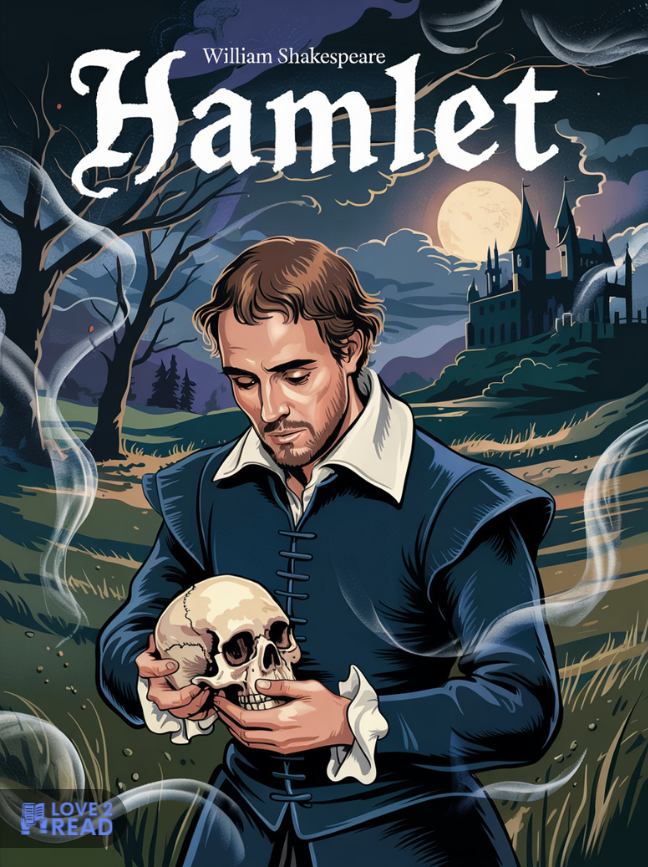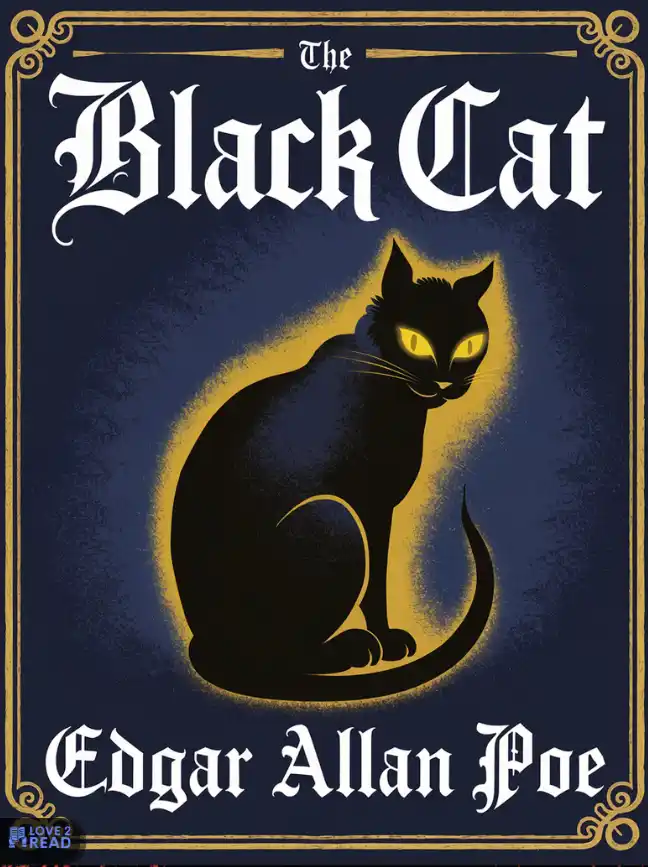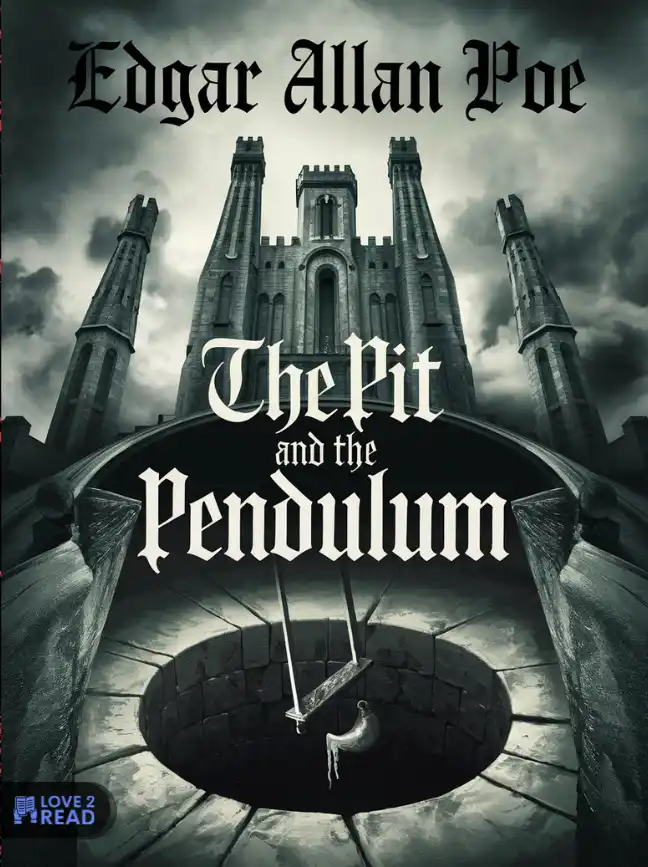(Another apartment in the castle.)
THE QUEEN AND POLONIUS enter .
POLONIUS.—He will come immediately. Remember to rebuke him without ceremony. Tell him his lapses have been allowed too wide a scope to be endured, and your Grace has had to stand between him and a great heat of anger. I will return in silence, even here; but, I pray you, lead him out swiftly.
THE QUEEN.—I assure you, fear nothing from me. Withdraw, I hear him coming.
(Hamlet enters.)
HAMLET.—Well, mother, what is it?
THE QUEEN.—Hamlet, you have greatly offended your father.
HAMLET.—Mother, you have greatly offended my father.
THE QUEEN.—Come, come, you answer me with an idle tongue.
HAMLET.—Go, go, you question me with a wicked tongue.
THE QUEEN.—What! What is it, Hamlet?
HAMLET.—What is it then?
THE QUEEN.—Have you forgotten who I am?
HAMLET.—No, by the holy cross, no, truly! You are the queen, your husband’s brother’s wife… and… would to heaven it were not!… you are my mother.
THE QUEEN.—Well! I will send you some people who will know how to speak to you.
HAMLET.—Come, come, sit down; you shall not stir; do not go out till I set you a mirror, where you may see your inmost self.
THE QUEEN.—What do you want to do? You don’t want to assassinate me? Help! Help! Whoa!
POLONIUS ( behind the tapestry ),—What is it? Hey! Help!
HAMLET.—What is it? a rat!28 ( He strikes a sword through the tapestry . ) Dead! A ducat he’s dead!
Note 28: (back) The English translator of Belleforest’s Tragic Histories had added to the story this cry of Hamlet’s, which had thus become a given of the subject, and which Shakespeare could not avoid reproducing; but how he prepared the explanation and the effect! At the end of the first act, Hamlet said that the play was the trap in which the king’s conscience would be caught. During the performance, he told the king that the play was called: The Mousetrap . So that this cry, which is for the queen a trait of madness, tells us at once that Hamlet believes he is killing in ambush the king whom he did not want to kill on his knees. This is how Molière, in The Feast of Stone , preserved all the circumstances which had struck the attention of the public and which had just been consecrated by the vogue of plays performed on the same subject in other theaters.
POLONIUS ( behind the tapestry ).—Ah! I am murdered!
(He falls and dies.)
THE QUEEN.—Woe is me! What have you done?
HAMLET.—Faith, I know not. Is it the king?
(He lifts the tapestry and pulls out Polonius’s body.)
THE QUEEN.—Ah! what a furious and bloody action this is!
HAMLET.—A bloody deed?—Almost as bad, good mother, as to kill a king and marry his brother.
THE QUEEN.—Than killing a king?
HAMLET.—Yes, madam, that’s the word I used. ( To Polonius . ) And you, miserable, absurd, troublesome fool, farewell! I took you for a better man than you are; take your lot as it is: you perceive there’s some danger in being too hasty… Cease wringing your hands. Peace! sit down, and expect to have your heart wrung by me, for that I will, if it be not of impenetrable matter, and infernal habit have not tanned it so as to be proof and fortified against all feeling.
THE QUEEN.—What have I done, that you dare to strike out your tongue with such a harsh noise against me?
HAMLET.—A deed that defiles grace and the blush of modesty; that gives virtue the name of hypocrite; that takes the rose from the serene brow of innocent love, and puts there a boil; that makes marriage vows as false as a gambler’s oaths; O! a deed that, from the form and body of the contract, takes away their very soul, and makes sweet religion a rhapsody of words! The face of heaven is inflamed; yea, verily, this solid compact, with a sad countenance, as at the threat of judgment, is sick to think of this deed.
THE QUEEN.—Alas! what is this action that roars so loudly and already thunders to announce itself?
HAMLET.—Look here, this picture first, and then this, this mock confrontation of two brothers… See what grace lay in that face; the mouths of Apollo, the brow of Jupiter himself, the eye like Mars’s for threat and command; a stature like Mercury’s herald, when he hath just swooped down on a height that kisses the edge of heaven; a countenance and form, indeed, where every god seemed to have set his seal, to give the world certainty to see a man: it was your husband. Now look at this: here is your husband, like the corn corrupted by mildew, that did eat his flourishing brother… Have you eyes? could you leave the pastures of this fair mountain, to fatten yourself in this marsh? Ah! have you eyes? you cannot call it love; for at your age the fermentation of the blood is subdued; he is humble, he is at the service of reason. And what reason would want to pass from this one to that one? Certainly, you have the faculty of feeling; without which you would not have the faculty of moving; but, assuredly, this faculty of feeling is, in you, struck with apoplexy, for madness itself would not be mistaken in this way, and never have the senses been enslaved to such a transport, that they did not remain a certain measure of discernment to perceive such a difference. What demon has thus played this game of blind man’s buff with you? Eyes without touch, touch without sight, ears without hands or eyes, smell without anything else, or even if only a crippled half of a single one of our true senses, could not be stupefied to this point… O shame! where is your blush? O rebellious hell! If you can thus mutinous the marrow of a matron’s bones, let us henceforth suffer that, for burning youth, virtue be like wax and melt in its own fire! Proclaim no longer that there is shame when the tyrannical ardor of age gives the assault, since ice itself is also active in burning, and reason intervenes to prostitute the will!
QUEEN.—O Hamlet! Say no more. You turn my eyes to the depths of my soul, and I see places there so black and so full of blackness, that they can never lose their hue.
HAMLET.—And that to live in the foul dampness of a soiled bed, all candied in joys in corruption, honeying their lips, and making love on a filthy dunghill!
THE QUEEN.—Oh! tell me no more! These words are like daggers entering my ears. Enough, my sweet Hamlet.
HAMLET.—A murderer and a villain! A footman, not the twentieth part of the tithe of your first master’s worth! A carnival king!29 a cut-purse of the empire and the laws, who took the precious diadem from a board and put it in his pocket!
Note 29: (return) A vice of kings ….. and below: A king of shreds and patches , double allusion to the character of the fool, the jester, who was called he vice , in English farces, and whose costume was composed of various and colorful fabrics like that of Harlequin.
THE QUEEN.—Enough!
HAMLET.—A king of bits and pieces!… ( The Ghost enters. ) Save me and cover me with your wings, heavenly guardians!… What does your gracious apparition want?
THE QUEEN.—Alas, he is mad!
HAMLET.—Have you not come to reprove your tardy son, who, failing in due time and in the impulse of his heart, leaves the weighty execution of your reverent orders to depart? Ah, speak.
THE GHOST.—Do not forget. This visit is only to refresh the almost faded memory of your purpose. But, look! stupor has seized your mother. Ah! place yourself between her and her struggling soul: ‘Tis in the weakest bodies that imagination works most strongly. Speak to her, Hamlet.
HAMLET.—What is the matter, madam?
THE QUEEN.—Alas! what is the matter with you, that you thus gaze into the void, and converse with the incorporeal air? Your vital spirits have darted into your eyes, and thence wildly spy, while, like sleeping soldiers when alarm comes, your hair, first lying down, now rises, as if its vegetation were springing to life, and stands upright. O my sweet son, pour on this heat and flames of your transport the patience of a colder blood. What are you looking at then?
HAMLET.—He, he! See how pale he shines! Such a form and such a cause, joined together to preach to stones, would make them sensible…. Look not upon me, lest by this piteous step you impair the firmness of my actions: perhaps my business would lose its true color; perhaps it would be tears instead of blood.
THE QUEEN.—To whom do you say this?
HAMLET.—See you nothing here?
THE QUEEN.—Nothing at all: and yet, all that is here, I see.
HAMLET.—And have you heard nothing either?
THE QUEEN.—No, nothing but our own words.
HAMLET.—Well! look there, look, how he retires, my father, in the dress he wore in his life! Look, he goes, even now, to the gate!
(The ghost exits.)
THE QUEEN.—It is your own brain that is struck by this image; delirium is very adept at these bodiless creations.
HAMLET.—Madness! My pulse, like yours, beats its time quietly, and sings no less wholesome music. It was not madness that made me speak: put me to the test, and I will repeat the thing word for word, while madness would only skip from it. Mother, for your salvation’s sake! Put not this flattering balm on your soul, think not that, instead of your fault, my madness speaks to you; it would but hide and mask the place of the boil, while the foul corruption, undermining all within, works to poison unseen. Confess to heaven, repent of the past, guard yourself against the future, and spread not the manure on the weeds, that they would grow stronger… Forgive me these duties of my virtue; for such is the soft swelling of this sluggish century that virtue itself must ask pardon of vice, yes, it is she who must bend and beg for permission to do it good.
THE QUEEN.—O Hamlet, you have broken my heart in two.
HAMLET.—Ah! cast off the worst part, and live the purer with the other half. Good night, but go not to my uncle’s bed; make yourself a virtue, if you have not. Habit, that monster that devours all reason to the common demon, is yet an angel in this; it gives us also, for the practice of fair and good actions, a raiment, a livery, that happily fits. Abstain to-night, and it will lend a sort of ease to the next abstinence; the next will be easier still, for use can almost change the stamp of nature, subdue the demon, or even drive him out, by a wonderful power. Once more, good night, and when you desire to be blessed, I will come to ask your blessing. As for that same lord of a moment ago ( pointing to Polonius ), I repent; but it has pleased heaven thus to punish me through him, and he through me; I have had to be their scourge and their minister. I take charge of him, and I will answer for the death I have given him. So, once again, good night; I must be cruel, but only to be humane: the evil has just begun, and the worst is yet to follow.
THE QUEEN.—What shall I do?
HAMLET.—Nothing, by any means, of what I bid you do. Nay, let this bloated king draw you to bed again, and pinch your cheek gayly, and call you his little mouse; let him, for a pair of smoky kisses, or a few plays of those damned fingers upon your neck, bring you to tell him all this matter, that I am not really mad, but mad by art. It were well you should let him know it; for what woman, but a fair, chaste, and wise queen, would hide from such a toad, such a bat, such a tomcat, secrets that interest her so dearly? who would do so? Nay, for all good sense and discretion, go to the house-top, and take off the peg that fastened the cage; let the birds fly; and then, like the famous monkey, slip into the cage to try it out, and break your neck on the ground yourself30 .
Note 30: (back) Another English author, from the beginning of the 17th century, Sir John Suckling, in one of his letters, seems to allude to the same children’s or popular story from which this passage of Shakespeare came: “It is,” says Sir J. Suckling, “the story of the monkeys and the partridges: you stand in amazement gazing at one beauty until it is lost to you, and then you let another out and gaze at it again until it is gone too.”
THE QUEEN.—Be assured that, if words are made of breath and breath is made of life, I have no life to breathe out a breath of what you have said to me.
HAMLET.—I must go to England, you know?
THE QUEEN.—Alas! I had forgotten it. Has it been decided?
HAMLET.—The letters are sealed already! And my two fellow-students,—Whom I’ll trust as I’ll trust vipers with their fangs,—Bear the warrant; they must clear the way, and guide me to the ambush! Let it be, for that’s the fun: to blow the engineer up with his own petard! Either the work will be very hard, or I’ll dig a fathom below their mine, and throw them into the moon. O! that’s sweet, when two devices meet just in a straight line!—This man will set me packing; I’ll drag this paunch into the next room31. Good evening, mother… Really, this counselor is now very calm, very discreet and very serious, he who was, in his life, such a simpleton and such a chatterer. Come, sir, let’s try to finish with you. Good evening, mother.
(They go their separate ways; Hamlet dragging Polonius’s body.)
Note 31: (return)The text reads:I’ll lug the guts into the neighbor room .
Should it be translated literally? Guts , the intestines. This is one of those verses that irritate people of taste against Shakspeare and his admirers. But most of the time people only get irritated because they don’t understand, and here, for example, Shakspeare doesn’t even need to be excused, provided that we don’t thoughtlessly translate the language of the 16th century with the dictionaries of the 19th. Just as in France people said estomac , where today they should say coeur , so in England, where today they should say entrails , they said guts in Shakspeare’s time; an English Corneille would not have hesitated to use it then, to paint Rome
…with his own hands tearing out his entrails,
and would not have been accused of falling into the baseness of language, because the euphuists themselves used it without scruple, although these precious men and women from across the Channel were as famous as our learned women
By the proscriptions of all the various evils
From which they wanted to purge both prose and verse.
But at the same time as I refer to the date of the text I am translating, I must be imbued with the author’s intention; it is not only from one century to another that the meaning of a word can change, but also from one page to another, especially in the variety of the drama, its scenes and its characters: guts is not coarse, in the time of Shakespeare, but it is sarcastic in the mouth of Hamlet; to translate by bowels would be a misinterpretation of the 16th century; by entrails , a misinterpretation of Hamlet and of his contempt for Polonius; he regards Polonius only as a fat body with an empty head, and he calls him “this belly,” much as, according to Saint Paul, Epimenides or Callimachus called the Cretans: “bad beasts, lazy bellies” (Ep. to Titus, I, 12). No doubt Hamlet could have dispensed with this last insult to a corpse: but let us not be too quick to blame Shakespeare, when there is a death on the stage; in his time, the actors were few in number in the troupes, the characters very numerous in the plays, so that each actor had several roles to fill and even the extras were hardly sufficient for their multiplied task; moreover, there were no intermissions, since there were no acts, and the scenes followed one another without interruption; also when one of the characters had just died before the public, the most urgent matter was to make him return to the wings, so that the corpse could become an actor again and pass to another role. when, to satisfy this necessity, the author could not introduce a sidekick because of the intimate nature of the scene, as in the present case, or for any other reason, it was necessary that one of the interlocutors take charge of pulling or carrying away the dead man, and it was necessary to save the improbability as best he could. Shakespeare always tried to accommodate to the situation and the characters the expedients that this scenic discomfort forced him to invent; he has all sorts: mockeries, imprecations, pathetic farewells, promises of revenge, precautions of the murderer, etc., etc., always some words that suit the action of the moment accompany the corpse being carried away and motivate the incident; only in the trilogy of Henry VI, we can note nine examples (part. I, act. I, sc. IV; act. II, sc. V; act. IV; sc. VII;—part. II, act. IV, sc. I; act. IV, sc. X; act. V, sc. II;—part. III, act II, sc. V, twice in the same scene; and act. V, sc. VI). If some find Shakspeare’s attention to such minutiae unworthy, or if others find the tricks he imagines to get out of trouble poorly concealed, we are of neither opinion. Passionately inspired and profoundly moralistic, Shakspeare still seems admirable to us for the very fact that he remembers at every moment that he is writing for the theater, and because he prepares the effect of the representation in detail by detail, while giving himself over to his poet’s verve and developing his knowledge of the human heart; and at the same time he is right to treat expedients as expedients; he is right not to chisel with pretentious art the pegs necessary for his great frames; when something is lacking in his resources as an impresario , he is right to make up for it with skill, but simply, and not to linger with his genius.
END OF THE THIRD ACT.





